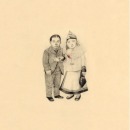Music Home / Entertainment Channel / Bullz-Eye Home
 Buy your copy from Amazon.com
Buy your copy from Amazon.com
| The Decemberists: The Crane Wife Released: 2006 |
Fans of the Decemberists who fear some sort of commercial transformation on the heels of the band’s move to a big label can relax…at least for now. This is still the artsy, lit-pop act whose third most popular song on iTunes (at press time) is “Here I Dreamt I Was an Architect.” (Huh?) Given the band’s lengthy song titles and image-laden lyrics, it’s not surprising to learn that frontman Colin Meloy has a degree in creative writing. He has a passion for storytelling and poetry, no matter how obscure, and the band’s fourth studio release, The Crane Wife, picks up where the band’s last effort, Picaresque, left off.
On that album, the Decemberists scored a hit with “16 Military Wives,” easily the band’s most popular work to date, skewering U.S. foreign policy in the process. The rest of Picaresque was traditional Decemberists’ fare, with subject matter (such as mariners, whales, child monarchs) that could have been plucked from an old English professor’s dusty library. The literary feel continues on The Crane Wife, and at least three of the songs are loosely based on a Japanese folk tale with the same name. In short, a poor man finds a crane with an arrow in its wing and nurses it back to health. After releasing the crane, a woman shows up on his doorstep and the two fall in love and marry. For income, the woman offers to weave beautiful clothes out of silk that the couple can sell at market. Her only condition is that the man can’t watch her work. As time goes on, the man becomes greedy and works his wife so hard that her health begins to fail. To find out what she does to make the silk so fine, he checks in on her and is shocked to discover a crane working at the loom, pulling feathers out of her skin and weaving them into the material. When the crane sees the man has broken his promise, she flies away, never to return.
The two tracks, “The Crane Wife 1 & 2” and “The Crane Wife 3,” are sung from the point of view of the poor man after the crane left him for good. The story and the songs are about regret, and the lyrics (from “3”) – “Each feather it fell from skin / ‘Til threadbare and she grew thin / how were my eyes so blinded?” – along with the chorus – “I will hang my head, hang my head low” – illustrate the point. Musically, “The Crane Wife 3” opens with the group’s folksy sensibility, but climaxes with some big Brit-rock chords, as if to emphasize the end of the tale. To get to the full feel of the story, it’s best to listen to the two tracks sequentially, but oddly, “The Crane Wife 3” opens the album, while “The Crane Wife 1 & 2” is the ninth track.
There’s another three-part story, “The Island,” that will attract fans of the band’s epic work – it’s over 12 minutes long - while those that enjoy the group’s pop pieces should enjoy “O Valencia!” and “Yankee Bayonet (I Will Be Home Then).” The latter features part-time Decemberist Laura Veirs in a duet with Meloy. Aside from the final two minutes of “When the War Came,” which are extremely grating, the entire album is quite pleasant, punctuated by the lovely “Sons & Daughters,” an up-beat, Irish-folk diddy that brings the album to a dreamy conclusion.
jpaulsen@bullz-eye.com






